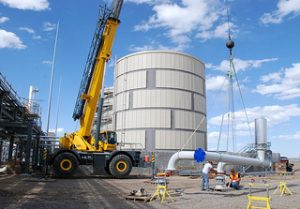 It’s almost that time again. If you own or operate any facility in New York City that uses or stores hazardous substances you must submit an annual report to the NYC Department of Environmental Protection (DEP). It’s part of the Community Right-to-Know filing program designed to protect public and environmental health and assist emergency first responders.
It’s almost that time again. If you own or operate any facility in New York City that uses or stores hazardous substances you must submit an annual report to the NYC Department of Environmental Protection (DEP). It’s part of the Community Right-to-Know filing program designed to protect public and environmental health and assist emergency first responders.
The reporting deadline is March 1.
But gathering all the information and documents you need and actually submitting the report can be daunting, so it’s best to get started right away.
You can submit your Community Right-to-Know filing online, which is faster and saves some money, but if you haven’t filed online in the past, it’s particularly important that you start the process right now. That’s because you have to apply for an official password and wait for it to arrive in the mail before you can access the online filing system. This can actually take a few weeks.
Who has to file?
Technically, any private business or public agency that stores or uses hazardous substances in amounts that equal or exceed the designated threshold reporting quantity (TRQ) for that substance. Sometimes the reporting quantities are very small, so be sure you understand the exact rules.
If you think reporting doesn’t apply to you, you must submit a letter to the DEP to that effect. They’ll pay you a visit to inspect your premises and verify your claim of “non-applicability.”
If you operate multiple facilities, you must file separately for each one.
If you don’t file, you’ll be at risk for penalties as high as $2500. The axiom “better late than never” applies here, so even if you’ve been avoiding this requirement, it’s best to get it over with and become an official part of the system to head off potentially worse problems or fines.
What’s involved?
There are five Community Right-to-Know filing requirements:
- As noted above, you have to report any hazardous substances that were on your premises in 2012 that meet or exceed TRQ levels. Chemicals are categorized as hazardous, extremely hazardous or toxic — you can find a list of NYC Hazardous Substances in your Community Right-to-Know packet.
- You also have to list any mixtures that contain hazardous substances, including the type and quantity of hazardous ingredients.
- You have to submit a Material Safety Data Sheet (MSDS) for each hazardous substance or mixture, not only to the DEP but to the NYC Fire Department and the State Emergency Response Commission (SERC). If you file your annual report online, there’s a click-on menu to select each MSDS, saving you substantial time and money over making copious paper copies.
- Hazardous substances at your facility must be labeled to show the name and chemical abstract service (CAS) number. Mixtures must also show the name and CAS number of all components.
- You must retain your Facility Inventory Forms on file — at your facility, so the information is readily at hand for education and training or emergency reference. If you file online, the system also retains this information, making future updating easier and faster.
While this process may seem straightforward, chemical data and conversions necessary to meet reporting requirements can be tricky and time-consuming. Even if you’re a talented procrastinator, this isn’t something you want to set aside for consideration in another month of two. Looking up information and reviewing everything to be sure you’re even ready to fill out the forms can take considerable time.
And you can be fined for filing incorrectly, just as if you didn’t file at all.
Help is available.
An environmental engineering professional can do this work for you. For them, Community Right-to-Know filing is just part of the job, so they can ensure your filing is complete and accurate.
For you, getting help means you can focus on activities that directly relate to building your business – product development, sales and marketing, strengthening customer service.
Photo Credit: PEO
